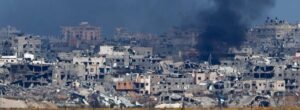The death of Hamas leader Yahya Sinwar on Wednesday was confirmed by the Israeli military. Israeli Prime Minister Benjamin Netanyahu claimed to have discussed pursuing a solution “to free the hostages” with President Biden.

These are the most recent advancements.
Yahya Sonar, the formidable and elusive militant leader who has been Israel’s top target since the start of the conflict, was confirmed dead in combat by the Israeli military on Thursday.
The horrific Oct. 7 attack on Israel, which sparked a 13-month battle that has left the Gaza Strip in a humanitarian crisis and sparked a larger conflict that now includes fighting in Lebanon, was thought to have been planned by Mr. Sinwar.
Israeli soldiers recovered what looked to be Mr. Sinwar’s body Wednesday following a shootout with Hamas fighters in Gaza. According to an Israeli official with knowledge of the situation, a DNA sample was taken to verify his identification. According to the Israeli police, Mr. Sinwar’s fingerprints and dental records, which were both on file, were also used for identification. The Hamas did not immediately respond.
Israeli leaders have stated time and again that they want to destroy Hamas. They launched the attack on the militant group in Gaza last October in response to Hamas’s cross-border operations, which resulted in the deaths of about 1,200 Palestinians and the kidnapping of over 200 more.
However, Mr. Sinwar personally was the most significant target for Israel. He was thought to still be keenly monitoring Hamas military activities throughout his year-long seclusion in the destroyed enclave.
With support from the US, Israel’s military and intelligence services expended a great deal of resources looking for Mr. Sinwar. But ultimately, four Israeli defense officials, who spoke on condition of anonymity due to the sensitive nature of the issue, said he was unexpectedly encountered by a unit of trainee squad leaders while on an operation in southern Gaza.
With the death of Mr. Sinwar, there is hope that the battle that has killed tens of thousands of Gazans and left many more in a humanitarian crisis will come to an end.
In a statement, Israeli Prime Minister Benjamin Netanyahu pledged to free the remaining hostages in Gaza but refrained from announcing a complete triumph over Hamas. In exchange for putting down their weapons and returning the hostages, he offered those in captivity the opportunity to “leave and live.”
In addition to giving Israel a military victory that would persuade the Netanyahu administration to soften its negotiation position, his death might persuade Hamas to accede to Israeli demands. During months of talks for a truce, Hamas and the Israeli government have remained far apart on important subjects.
Here’s more information:
Following Yahya Sinwar’s passing, President Obama called Israeli Prime Minister Benjamin Netanyahu on Thursday, according to Netanyahu’s office. According to the statement, the two leaders “agreed that there is an opportunity to advance a deal to free the hostages and they will work together to achieve that goal.” For months, Israel and Hamas have been blaming one another in the cease-fire negotiations that would result in the release of the remaining hostages in Gaza.
“We know the people of the region reject the path that Sinwar wanted for the region—ddeath, destruction, instability, chaos,” Miller, a spokeswoman for the State Department, said. “The atrocities of the previous year do not have to be the future, nor can they be the future. It’s time to take a new course.
After considering the suffering of the Palestinian people, Miller expressed his hope that the next Hamas leader would choose “to pursue a different path forward.” He refused to make any assumptions about the identity of that Hamas leader.
In a briefing with reporters on Thursday, State Department spokesman Matthew Miller blamed Sinwar for the suffering of Palestinians in Gaza and the deaths of people from around 30 nations, including Israel and the United States. He described the Hamas leader as the “chief obstacle” to cease-fire negotiations and claimed that his passing presented “a seismic opportunity” to resume war-ending discussions.
The United States will “redouble its efforts with partners to end this conflict,” according to a statement released by U.S. Secretary of State Antony J. Blinken in response to Yahya Sinwar’s death. The statement also aims to “secure the release of all hostages and chart a new path forward that will enable the people of Gaza to rebuild their lives and realize their aspirations free from war and free from the brutal grip of Hamas.”
Supported by the United States, Israel’s security agency spent more than a year searching for Yahya Sinwar, the Hamas leader who planned the Oct. 7 assaults, and amassed a mountain of intelligence.
But in the end, four Israeli defense officials, who spoke on condition of anonymity due to the sensitive nature of the issue, said that a unit of trainee squad leaders unexpectedly came across Mr. Sinwar while on an operation in southern Gaza.
Speaking about Yahya Sinwar’s passing following a campaign stop in Milwaukee, Vice President Kamala Harris declared that “justice has been served.” “He had American blood on his hands,” she continued. According to Harris, Israel’s offensive in Gaza should end as a result of Sinwar’s passing. “We have a chance to put an end to the war in Gaza at last,” she stated.
Israeli Prime Minister Benjamin Netanyahu praised Sinwar’s passing, referring to the Hamas leader as “a mass murderer who killed thousands of Israelis and kidnapped hundreds of our citizens.” He did not, however, go so far as to declare Israel’s fight against Hamas a complete triumph. Netanyahu declared, “Today, evil took a heavy blow—the mission ahead of us is still unfinished.” “An important milestone in the sunset of Hamas’s evil rule in Gaza,” he continued, referring to Sinwar’s passing.
Netanyahu said that if the Gazans who were holding the dozens of hostages who were still in the enclave put down their weapons and gave the hostages back, they would be permitted “to leave and live.” However, he said that anyone who hurt Israeli detainees would pay with their life, maybe in retaliation for Sinwar’s passing.
The death of Yahya Sinwar, their principal kidnapper, caused both great relief and intense fear for the fate of the hostages, according to the relatives and supporters of the scores of hostages still in Gaza.
Anna Artmaker, a cousin of Karina Arrive, a surveillance soldier who was kidnapped from her army base near the Gaza border last year and who turned 20 while in captivity, said, “On the one hand, it’s a national closing of the circle.”
Amid a string of Israeli attacks on its affiliated militant groups in the region, the murder of Hamas commander Yahya Sinwar constitutes yet another tactical and morale blow for Iran, a major supporter of the organization. Although Iranian officials have not yet responded, government supporters and commentators have begun expressing their condolences on social media. Sinwar’s biography was released by Iranian state news outlets, which also predicted that Hamas’s ideology would persist long after its leaders passed away.
The militant group suffered a serious setback with the assassination of Hamas leader Yahya Sinwar, who was assassinated by Israeli forces in Gaza on Wednesday.
One of Israel’s main goals in the conflict in Gaza has been to overthrow Hamas’s leadership, and Mr. Sinwar is one of its main targets. Mr. Sinwar, who has long been regarded by Israel and the US as the architect of Hamas’s military strategy in Gaza, also assumed the position of political leader of the group two months ago following Ismail Haniyeh’s murder.
The body of a man with facial features strikingly similar to those of Hamas commander Yahya Sinwar appears to be depicted in photographs obtained by The New York Times, some of which were later shared online. It is impossible to tell if the man’s body is Sinwar’s due to numerous serious injuries, including those to the head and a leg. Nonetheless, the images reveal that the body exhibits a number of characteristics, such as crooked teeth and characteristic moles close to Sinwar’s eyes, that are consistent with those seen in historical video.
In response to news that the Hamas commander Yahya Sinwar may have been killed on Thursday, some Gazans questioned whether the year-long Israeli war in Gaza would be resolved if the death of the Hamas leader were confirmed.
According to some, they were happy to hear of his passing in the hopes that the war would finish soon. Others expressed skepticism about the reports and hoped they were untrue.
In a statement, the Israeli police said they were collaborating with the military and intelligence services to determine whether Yahya Sinwar had been killed. According to the police, “one of the many tests required for a certain identification has been carried out so far.” They also stated that DNA testing was in progress and that dental pictures had been forwarded to a police forensic lab for analysis. According to the police, the body’s identity won’t be known until testing is finished.


